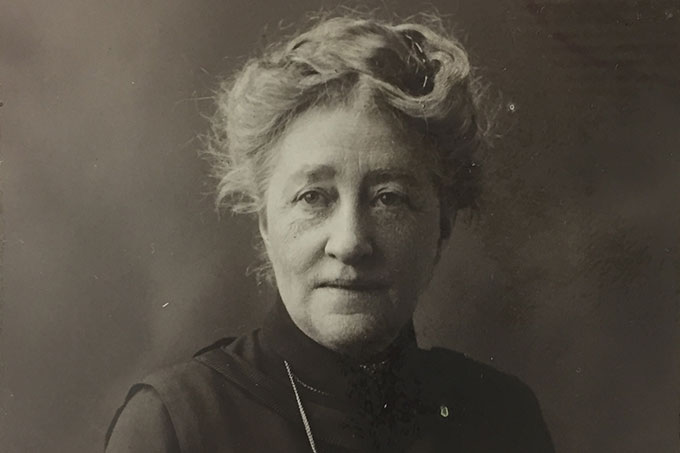Professor Carolyn Oulton recognises Sarah Grand, an author, writer, campaigner and the person who the phrase ‘New Women’ was first attributed to.
As a book title The Heavenly Twins sounds safely conventional. But Sarah Grand’s tale of female rebellion, mental breakdown and syphilitic death caused outrage on its first publication in 1893. Nothing daunted, she was back in March 1894 for a media slanging match with fellow author Ouida, who had described the emerging ‘New Woman’ as an unmitigated bore. Neither of these bestselling authors could have foreseen what happened next. The phrase caught on, attracting both mockery and alarm in the popular press. The ‘New Woman’ quickly came to represent a distinctively modern type of feminist, with an estimated 100+ novels joining the debate over the next five years.
So who was this Sarah Grand, who could cause such trouble with a 700 page novel and more trouble still with a single journal article? Born in Ireland as Frances Elizabeth Bellenden Clarke, she was married off at 16 to a surgeon called David McFall. After the breakdown of her marriage she moved to London, changed her name and began writing campaigning fiction.
In 1898 she moved to Tunbridge Wells, where she became President of the local branches of the National Council of Women and the National Union of Women’s Suffrage Societies, and a member of the Women Writers’ Suffrage League. In 1903 the Ramsgate Constitutional Institute asked her to speak (presumably tongue in cheek) on the topic ‘Mere Man’. Grand found herself in still more literary bother in 1913, when suffragettes were blamed for burning down Sir Arthur Conan Doyle’s local cricket pavilion. Barred from the meeting at which this action was condemned, Grand paid a man with a sandwich board to parade round the town explaining that she had had nothing to do with it.
An acquaintance of Siegfried Sassoon, Grand later got involved with the local war effort, joining a meeting in 1915 to discuss the inauguration of a Women’s Volunteer Reserve Movement. She moved to Bath in 1920, serving as Lady Mayoress from 1922 to 1929.
Madame Grand as she was known, died in 1943, respected by the establishment she had challenged for so many years. But her archive, held by the International Centre for Victorian Women Writers, tells a more complex story. Among her personal effects is a cigarette case and the remains of a smoked cigarette, the ultimate symbol of the New Woman. As Grand’s cross-dressing ‘Heavenly Twin’ Angelica says, ‘There is no room to move on a pedestal.’
Artefacts from Sarah Grand’s archives will be on display as part of the Inspirational Kent Women Writers event on 2nd of March 2024. This exhibition by the University’s International Centre for Victorian Women Writers (ICVWW) will explore the lives and experiences of Kent women writers through archival material now in the University’s Library Special Collections.
The exhibition accompanies a day of talks on Kent women playwrights, novelists, historians and poets including Elizabeth Elstob, Elizabeth Carter, Sarah Dixon, Bessie Marchant and Vita Sackville West.
This event is free but booking is essential. To find out more and book you visit here.
Carolyn Oulton is Professor of Victorian Literature and Director International Centre for Victorian Women Writers at the University. she is also Co-Lead for Kent Maps Online.
 Expert comment
Expert comment Jeanette Earl
Jeanette Earl 2345
2345


